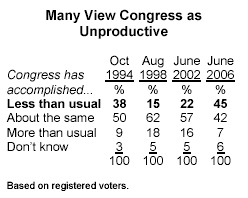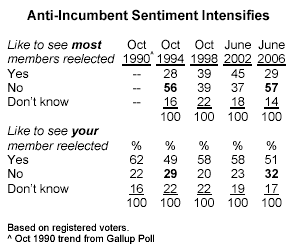by Richard Morin
Members of the U.S. Senate have now joined their colleagues in the House of Representatives on summer recess — and perhaps not a moment too soon for most Americans.
Recent surveys suggest this Congress has largely failed to meet even the modest expectations of the public. In surveys taken in July and early August of registered voters as well as the general public, the percentage who approve of the job Congress has been doing has averaged about 27%.
Ominously for incumbents and perhaps for Republicans, that anemic approval rating is roughly equal to what was recorded in the summer before the 1994 mid-election, when control of Congress switched from the Democrats to Republicans and 34 Democratic House incumbents were defeated.
With three months left in its two-year term, the polls suggest that the 109th Congress has made its mark on the public mostly for what it hasn’t done.
 A survey by the Pew Center for the People & the Press in June found that 45% of registered voters said the current Congress had accomplished “less than usual.” That’s double the proportion who expressed a similarly sour view four years ago and even higher than the 38% level of dissatisfaction recorded on the eve of the 1994 election.
A survey by the Pew Center for the People & the Press in June found that 45% of registered voters said the current Congress had accomplished “less than usual.” That’s double the proportion who expressed a similarly sour view four years ago and even higher than the 38% level of dissatisfaction recorded on the eve of the 1994 election.
At the same time, however, many Americans say the current crop of Senators and Representatives have spent too much time on marginal issues that are of consequence only to narrow slices of the electorate. For voters, it seems, it could hardly be worse: A “do-nothing” Congress that’s done too much of the wrong things.
A majority of voters — 53% — in a July Fox News-Opinion Dynamics survey said that this Congress wasn’t “currently working on issues that are important to most Americans.” Those findings echo an April survey by CBS News which found that two-thirds of the public thought Congress was accomplishing “less than it usually does during a typical two-year period.”
What problems do Americans think Congress should be addressing? Gay marriage and the inheritance tax–both issues addressed by the Republican-dominated Congress — rated near the bottom of the public’s priorities in June, according to the Pew poll. At the top: education, health care, the economy, Social Security and Iraq — issues that, for the most part, were still on legislators’ to-do list when they broke camp for the summer.
As a consequence, it’s possible that the reception that incumbents of both parties, and particularly Republican officeholders, receive from voters at home this hot summer will be cool but not refreshing. A survey by the Wall Street Journal and NBC News in late July found that only 38% of all voters said their representative “deserves to be re-elected” — the lowest level of support recorded by this survey so far this year.
 More broadly, the June Pew survey found that nearly six in 10 (57%) said they would prefer if “most” members of Congress were defeated in November — 20 percentage points higher than said so at this stage of the campaign four years ago.
More broadly, the June Pew survey found that nearly six in 10 (57%) said they would prefer if “most” members of Congress were defeated in November — 20 percentage points higher than said so at this stage of the campaign four years ago.
Growing dissatisfaction crosses party lines. Fewer than half of all Republicans (43%) currently think most members of the House should be re-elected — this despite the fact that the GOP controls the chamber. Just under a quarter of all Democrats (22%) and independents (24%) want to see most members reelected.
What a difference an unpopular war and problems on the home front have made: Four years ago, 53% of Republicans, along with nearly half of all Democrats (45%) and 36% of independents thought most Representatives should be returned to office.


